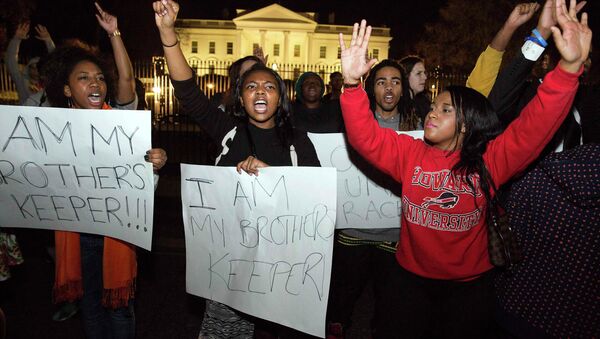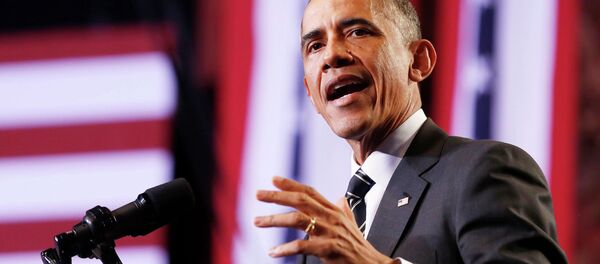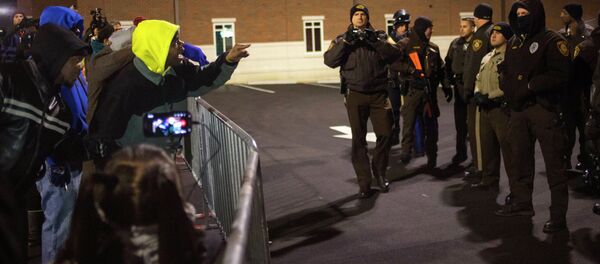WASHINGTON, November 26 (Sputnik) – African-American activists have hit the streets in peaceful protest in Washington, DC in the wake of the Michael Brown case decision, calling on the city government and police to protect, not marginalize, the African-American community.
"Any young black person that grows up in a black community knows that there is a police problem in this country," coordinator of the DC Chapter of the Black Youth Project (BYP) Jonathan Lykes told Sputnik in front of the Washington, DC Office of Police Complaints Tuesday.
"At some point there is a breaking point where people are going to start to organize and stand up and fight back," Lykes added.
The call to protest came following Monday's grand jury decision in Ferguson, Missouri, not to indict police officer Darren Wilson in the fatal killing of 18-year-old African-American Michael Brown in August. The jury's decision came after nearly three months of deliberation, over a case that reignited issues of race and police brutality throughout the United States causing massive protests around the country over the summer.
Lykes and at least 70 others protesters were there to deliver a letter, requesting a meeting with the Office of Police Complaints to outline BYP's agenda for a "safer fairer and better Washington, DC that works for young Black Washingtonians rather than against them", according to a copy of the letter obtained by Sputnik. As two members delivered the letter around 70 protesters lay on the ground in a symbolic "die-in" in protest against the killing of Michael Brown and police violence.
BYP's agenda calls for increasing community oversight and accountability over law enforcement agencies, repealing criminal laws targeting youth, requiring police to wear body cameras and demilitarization of police.
Speaking to the crowd, another young coordinator of the BYP, Fresco Brilliance, said at least 40 people have been killed by police since the death of Michael Brown.
"We know that a black person dies every 28 hours from a police officer, security guard or vigilante," Brilliance stressed.
Lykes noted that while DC police are not as bad as police in Ferguson, "there is a police problem and it's systemic and we need to talk about it on an institutional level".
"What we saw last night [in Ferguson] was people's anger. What we see today is being people's anger turning into power and organizing," Lykes said.
"Last night there was not a peaceful protest. Last night was the manifestation of years of anger and discord that has been existing between black communities and police officers," he added.
One protester, Aaron Goggans, told Sputnik he was there to protest because "it's important for people, who face racism on a daily basis to articulate that pain and let the larger society know we are not happy with what's going on".
Goggans called for a more open dialogue about how state violence affects different communities.
The protest started on Tuesday morning at the DC police headquarters and includes stops at the DC City Council and the office of the new mayor before culminating in a larger, city-wide rally downtown.
Thirty-eight US states, Washington DC and over 140 other US cities have organized demonstrations throughout the day on Tuesday as part of "Emergency Response Protests to Ferguson Grand Jury Decision".
US President Barack Obama admitted Tuesday that what is happening in Ferguson is proof of deeper internal problems in the country.




